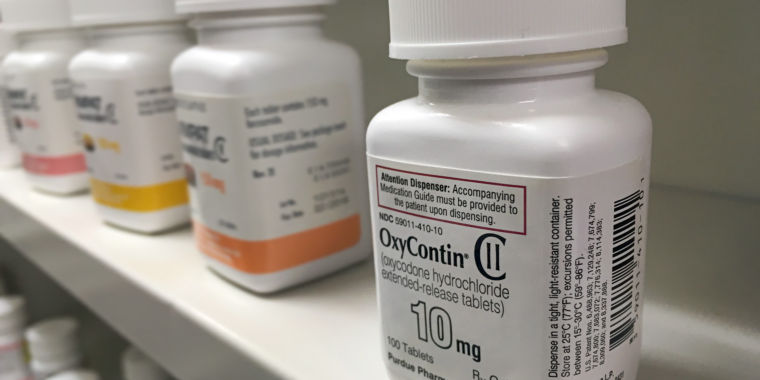After spending millions to combat the opioid epidemic ravaging its citizens, the working-class city of Everett, Washington, is taking the maker of opioid painkiller OxyContin to federal court. The city claims that the drug maker, Purdue Pharma, knowingly sold to black markets out of pure greed, enabling the devastating epidemic hitting Everett and the rest of the country.
According to the lawsuit (PDF) filed in federal court in Seattle, Everett accuses Purdue Pharma of “knowingly, recklessly, and/or negligently supplying OxyContin to obviously suspicious physicians and pharmacies and enabling the illegal diversion of OxyContin into the black market, including to drug rings, pill mills, and other dealers for dispersal of the highly addictive pills in Everett.” Purdue’s goal, Everett alleges, was to “generate enormous profits” at the expense of the people of Everett.
Purdue isn’t new to court battles. In 2007, the infamous drug maker and three of its executives pled guilty in federal court and paid out $634.5 million in fines for purposefully misleading regulators, doctors, and patients about the addictiveness of their opioid painkiller. Around the same time, Purdue was also sued by several states, including Washington, over similar allegations. Purdue agreed to a $19.5 million multi-state settlement. And in 2015, Purdue settled a case with Kentucky, agreeing to pay $24 million.
As part of the state settlements, Purdue was supposed to set up monitoring programs to make sure that its opioid drug didn’t wind up in the wrong hands. It was supposed to watch out for shady pharmacies, unusually large orders, or suspiciously frequent orders. But on this front, Everett alleges that Purdue once again put profits over people.
“Our community has been significantly damaged, and we need to be made whole,” Everett’s mayor, Ray Stephanson, told ABC News.
In the lawsuit, Everett lays out internal Purdue e-mails that indicate that the drug maker was aware in 2009 that it was selling large quantities of OxyContin to an illegal drug ring based in Los Angeles. Yet, Everett claims, Purdue kept selling to the ring and didn’t notify the Drug Enforcement Administration, as it is legally required to do. The lawsuit also alleges that a Purdue executive referred to the company’s internal list of shady buyers as a “gold mine.”
The lawsuit notes that one of the drug dealers involved with the LA-based drug ring moved to Everett, which is north of Seattle, and began trafficking OxyContin there. In 2010, he was arrested, charged, and pled guilty to trafficking in Everett. The ring was also shut down. All in all, the scheme is thought to have diverted more than a million OxyContin pills onto the black market—and netted Purdue more than $15 million.
In a statement, Purdue disputed Everett’s claims, saying that it did notify the DEA and acted responsibly. “We look forward to presenting the facts in court,” the company said. Purdue also said that its opioids now account for less than two percent of US opioid prescriptions.
In 2008, Everett experienced a spike of overdose deaths from OxyContin and other opioids, ABC notes. The city experienced another spike in 2010 of deaths from heroin, which is stronger and cheaper. Between 2011 and 2013, nearly one in five heroin-related deaths in the state of Washington occurred around Everett, a trend the city will argue was spurred by Purdue.
Source: arstechnica.com



